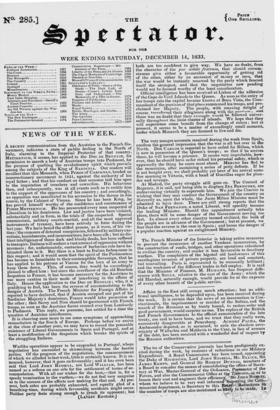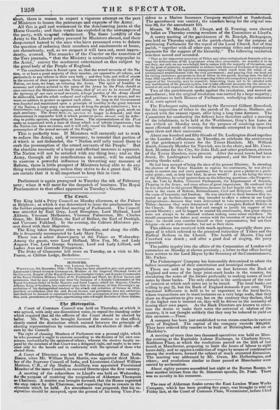The ire of the Conservative journals has been prodigiously ex-
cited during the week, by rumours of reductions in our Military Expenditure. A Royal Commission has been issued, appointing the Duke of RICHMOND, Lord JOHN RUSSELL, Mr. ELLICE, Sir JAMES KEMPT, and General Sir ROBERT DCNDAS, members of a Board to consider the means of consolidating the offices of Secre- tary at War, Master-General of the Ordnance, Pat mEster of the Forces, and also the Commissariat Office at t e Tiosurycso as to. lessen their cost and augment their effieienc -Sir. ON:IlistETT, whom we believe to be very well inform ‘in-ethe COb missariat department, is Secretary to this ‘-:-<:..tteductiOns_ the number of troops are also mentioned as 'kiltel ialse'inide.: 10-7
- - abort, there is reason to expect a vigorous attempt on the part of Ministers to lessen the patronage and expe,iihe of the Army.
All this is gall and wormwood to the domineering junta at the Horse Guards ; and their wrath has exploded in the newspapers of the party, with uniksnal vehetnence. . The fierce hostility of the Army to the Liberal policy pursued by Ministers abroad, and their deep-rooted hatred to the men who have presumed even to debate the question of reducing their numbers and emoluments at home, are shamelessly, and, as we suspect it will turn out, most impru- dently, avowed. The remarks of the Courier on the assertion of the Tory journals, " that the Ministry is universally unpopular in the Army," convey the sentiment entertained on this subject by tbe great body of the People of England.
" The conclusion then is forced upon us, that the armed servants of the Na- tion, or at least a great majority of their number, are opposed to all reform, and phrticularly to any reform in their own body ; and they hate, and will of course to the utmost of their power oppose, those Ministers who, in the interest of the Nation, are bent, we hope, on reducing the Army. The spirit of hostility to economy and reform avowed in the name of the Army by the Post, should at owe convince the Ministers and the Nation, that if we are to be rescued from the tyranny of our own armed servants, a large portion of the Army should be disbanded, and the whole seduced and reformed. We are at peace, and we want no soldiers to protect us against each other. As long as the Government was founded and maintained upon a principle of hostility to the great interests of the Nation, a large army was necessary to keep the people submissive; but a Government AnIvIvIng pohlic opinion, and acting for the public good, needs no such auxiliary. The Army ends its teeeieee en longer in demand ; and that Government is unpopular with it which preserves peace abroad, and, by defer- ring to public opinion, tranquillity at home. The representations of the Post make us acquainted with a state of things which is of infinite importance; but the Nation can have no choice, and it will rally round the Ministry to curb the presumption of the armed servants of the People."
This is perfectly true. If Ministers will earnestly set to work to reduce the Army, and, if necessary, to remodel that portion of it which is not disbanded, the " Nation will rally round them to curb the presumption of the armed servants of the People." But the absolute necessity of a large and effectual measure is apparent. The Nation will not be satisfied with any thing less; and as the Army, through all its ramifications in society, will be enabled to exercise a powerful influence in thwarting any measure 'of Reform, there is little prospect of Ministers being able to do any thing worth mentioning, unless they strive to do a great deal. We are certain that it is all-important to keep this in view.

















 Previous page
Previous page